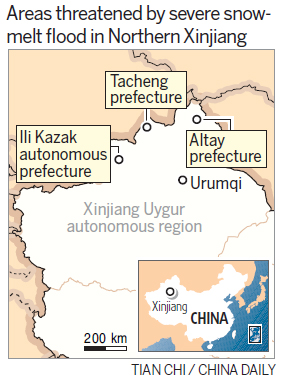Government and Policy
Spring thaw poses flood threat
By Cui Jia (China Daily)
Updated: 2010-04-13 07:09
 |
Large Medium Small |

Although farmers have been badly affected, experts warn that herdsmen in Tacheng and Altay, who are mostly from the Kazak ethnic group, are far more vulnerable to extreme weather because of their nomadic lifestyles.
Winter in Xinjiang usually lasts about six months and brings frequent blizzards, meaning its 1.5 million or so herdsmen are forced to move from place to place searching for food and water sources for their livestock.
After this year's snowstorms and floods, the Ministry of Civil Affairs reacted by shipping urgent relief for victims, including 8,000 cotton tents, 20,000 coats, and 20,000 quilts. However, the authorities found it extremely difficult to deliver aid to the herdsmen isolated deep in the mountains.
The Xinjiang government has been working to improve the quality of life of herdsmen since 2004, when it introduced a project to build special residential areas for their families. The move was aimed at allowing them to settle in one place, as well as enable their children to receive proper and continuous education, said officials.
|
||||
As of the end of last year, 580,000 herdsmen and their families had started new lives in the developments. Authorities plan to settle another 760,000 - more than half of the region's total population - by 2020.
In Qibaerqidie, a newly built residential area in Tacheng, former nomadic herdsmen all have homes equipped with solar electric generators, while their livestock have pens and large stretches of land to forage. The community also has a school and hospital. Each property cost about 25,000 yuan. Families pay about 5,000 yuan, and the rest is shared between the central and regional governments.
While nomadic herdsmen waited weeks for aid during the snowstorms and floods, leading to the death of thousands of sheep and cattle, those in Qibaerqidie were unaffected.
Metgen Karbush, 70, and her family moved into the neighborhood about two weeks ago after growing tired of coping with the harsh conditions in the mountains. The family lost almost half its livestock this winter.
"First came the heaviest snow I've ever seen and then the floods came. We were completely helpless in the mountains," she said while watching satellite television in the warmth of her new home. "I've been a nomadic herdsman since I was born. I always believed it is the way to be but now I regret not moving here earlier."
Karbush and family are among many herdsmen in Tacheng prefecture who have had a change of heart about joining the housing project since the beginning of winter, said officials responsible for the developments.
Although her family cannot afford the house, the government allowed them to move in. "We will pay for it later when we have sold the wool and meat of our livestock," she said.
Mao Weihua contributed to this story.
(China Daily 04/13/2010 page1)







